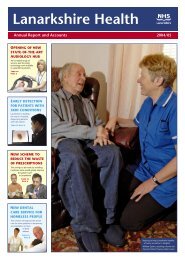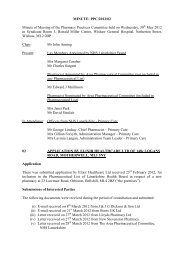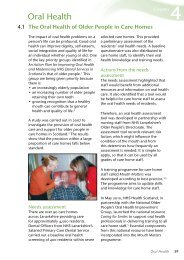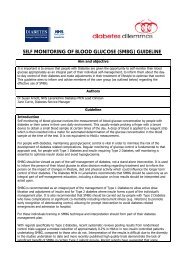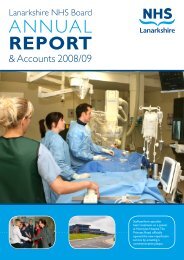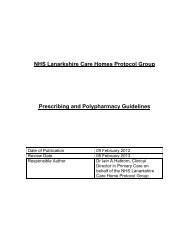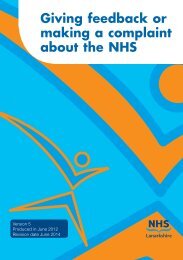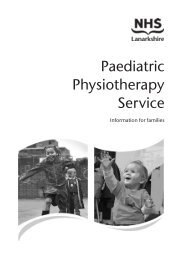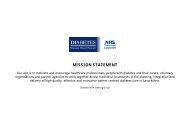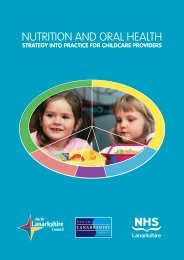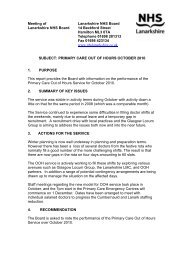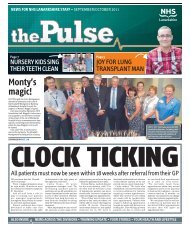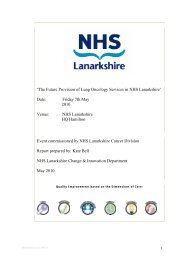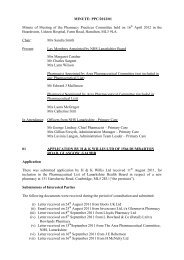Palliative Care Guidelines - NHS Lanarkshire
Palliative Care Guidelines - NHS Lanarkshire
Palliative Care Guidelines - NHS Lanarkshire
- No tags were found...
You also want an ePaper? Increase the reach of your titles
YUMPU automatically turns print PDFs into web optimized ePapers that Google loves.
Last days of lifeIntroduction<strong>Palliative</strong> <strong>Care</strong> <strong>Guidelines</strong>: Last days of lifeWhen all reversible causes for the patient’s deterioration have been considered, themulti-disciplinary team agrees the patient is dying and changes the goals of care.Reversible causes to consider include• dehydration • infection • opioid toxicity• renal impairment • hypercalcaemia • deliriumClinical signs of dying may include:Patient is bedboundOnly able to take sips of fluidManagement of a dying patient and their familyIncreasingly drowsy or semicomatoseDifficulty swallowing tabletsPlan and document care; consider using a care pathway or checklist.Team• Discuss prognosis (patient is dying), goals of care (maintaining comfort) and preferred place ofdeath with the patient and/or family.• If discharge home is possible, prompt and careful planning are needed. Contact GP,community nurse and occupational therapist urgently.Medical staff• Clarify resuscitation status; check DNAR form has been completed. (See: local policy)o Reassure the patient and family that full supportive care will continue.• Discontinue inappropriate interventions (blood tests, IV fluids and medication, vital signsmonitoring, frequent blood sugar tests).• Medication – review at least once daily.o Stop any treatment not needed for symptom control.o Choose an appropriate route. If able to swallow, consider liquid formulations otherwisechange to the subcutaneous or rectal route.o Consider need for a SC infusion of medication via a syringe driver/pump.o Anticipatory prescribing of as required medication in advance for common symptoms.• Hydration:o Discontinue tube feeding/ fluids if respiratory secretions are present, if there is risk ofaspiration due to reduced conscious level, or at the patient’s request.o Over-hydration contributes to distressing respiratory secretions.Artificial fluids are usually not appropriate, but if indicated can be given subcutaneouslyovernight. (See: Subcutanous fluids)Nursing staff• Comfort nursing care (pressure relieving mattress, reposition for comfort only), eye care, mouthcare (sips of fluid, oral gel), bladder and bowel care.• Explain to the family why the nursing and medical care has been altered and what changes toexpect in the patient’s condition. (See leaflet: What happens when someone is dying)• Ward team; record arrangements for contacting the family when the patient deteriorates or dies.Community team; ensure the family/ carers know who to contact when the patient dies.• Consider emotional, spiritual/ religious, legal and family needs including those of children.• Identify those at increased risk in bereavement and seek additional support.o Previous multiple losses or recent bereavemento Ambivalent or dependent relationshipo Living alone and lacking a support networko Mental illness, drug or alcohol dependencyo Dependent children(See: Bereavement on website)© <strong>NHS</strong> Lothian Issue date: January 2009 Review date: March 20121



